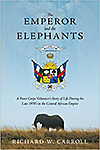Review — THE EMPEROR AND THE ELEPHANTS by Richard Carroll (CAR)
 The Emperor and the Elephants: A Peace Corps Volunteer’s Story of Life during the Late 1970s in the Central African Empire
The Emperor and the Elephants: A Peace Corps Volunteer’s Story of Life during the Late 1970s in the Central African Empire
Richard W. Carroll (Central Africa Republic 1976–82)
Peace Corps Writers
May 2016
186 pages
$15.00 (paperback); $3.99 (Kindle)
Reviewed by Mark T. Jacobs (Paraguay 1978–80)
•
A LONG-TIME WILDLIFE CONSERVATIONIST, Richard Carroll began his engagement with Africa as a Volunteer in the Central African Republic in the late 1970s. His memoir spans the decades that have come and gone since then while emphasizing the early years. Although the natural world is the focus of the book, Carroll draws a human frame around his observations of animals, plants, terrain, and the weather. He does this two ways. Both of them enrich the narrative, leaving the reader with an appreciation of the complex interactions of humankind with the planet we inhabit, along with a heightened awareness of the threat to the environment that our actions pose.
In the first place, Carroll describes the political environment of the Central African Republic in the 1970s, which saw the bloated excesses of one of the continent’s twentieth-century autocrats, Jean Bidel Bokassa. Bokassa declared himself president for life in 1972, with the backing of France, still a power broker in the region. Carroll’s description of the imperial coronation ceremony in 1977, which cost more than the country’s annual budget, is worth the price of the book.
As a Volunteer, the author was on hand to witness some of the defining political moments of his country of service, including a parade a through the town of Mbaiki. The parade featured not just Emperor Bokassa but his would-be patron, the Libyan strongman Muammar Gaddafi. Blowing through town, both men waved to the crowd from the security of an armored vehicle. In that crowd stood the author, whose Peace Corps training took place in Mbaiki.
The sense of immediacy, the feel of being there, give point and texture to Carroll’s descriptions of the depredation of the environment that took place during the reign of men like Bokassa and, next door in what was then known as Zaire, Mobuto Sese Seko. His chronicle of the devastation wrought by poachers hits this reader with particular force.
Carroll’s second technique for wrapping the natural world in a human frame is the use of journal entries that are contemporaneous with his Peace Corps tenure, followed by present-time comments. This can be a dangerous approach, revealing one’s young, more exuberant self both to the mature adult one has become and to the world. Carroll pulls it off with grace. His passionate conviction of the need to make our peace with the world rather than batter it into submission informs both the original journal entries and his more recent prose. That conviction is the glue that holds together the strands of a narrative that covers multiple decades.
Carroll’s profound knowledge of animal life in Africa is on display throughout the memoir not to show off, but to convey to readers less familiar than the the beauty of the world they inhabit, and the seemingly permanent threat that human activity presents to it. It seems appropriate that Carroll’s work included long experience with the World Wildlife Fund.
The Emperor and the Elephants is a moving testament to a professional life well lived.
•
Mark Jacobs has published 120 stories in magazines including The Atlantic, The Baffler, Playboy, The Iowa Review, and The Southern Review. He has stories forthcoming in The Hudson Review and several other magazines. A full list of his publications including books can be found at markjacobsauthor.com.
To order The Emperor and the Elephants from Amazon, click on the book cover, the bold book title or the format of the book you prefer — and Peace Corps Worldwide, an Amazon Associate, will receive a small remittance that will help support our annual writers awards.
No comments yet.
Add your comment